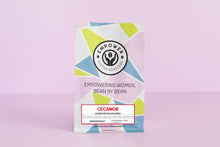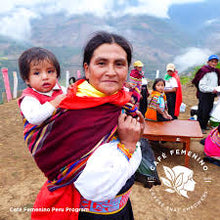Introducing Cecanor, our first Peruvian coffee!
Peru is not exactly known for coffee compared to neighboring countries in South America, and we think that's crazy! Some of the best coffee in the world being produced right now is from Peru, especially from the Cecanor Co-Op. Which is why we just had to have it!
The women of CECANOR are proud to be the originators of the Café Femenino concept. While women have always been crucial to coffee production in Peru, men traditionally held the economic power. In 2004, 464 female coffee producers in Peru united to change this dynamic and take a step toward empowerment by creating the first Café Femenino co-op. They decided to separate their coffee production from men to gain visibility and a voice inside their community. Working in partnership with OPTCO, they developed a never-before-existing market for women-produced coffee to serve as an important vehicle for social change and the empowerment of poor, marginalized women coffee farmers.
After more than 13 years, domestic abuse and malnutrition rates have gone down, education and income equality rates have gone up, and the women are no longer too timid to speak. They now stand up in front of groups, make presentations, and hold several elected positions on the boards of the coffee associations of Cecanor. Their hard work and courage means the women in their community have more decision-making power, more income, and more dignity than ever before.
Coffee Profile
Roast Level: Medium
Aroma: Floral, almond, cashew, chocolate
Tasting Notes: Dark chocolate, maple syrup, medium body with balanced acidity
Origin: Peru
Region: Lambayeque
Altitude: 1,000 - 2,050meters asl
Varietals: Tipica, Bourbon, Catimor, Gran Colombia, Villa Sarchi
Processing Method: Fully washed and sun dried
How the Program Impacts Their Communities
Food Security
To fight the adverse effects of malnutrition—including stunting, academic deficiencies, and increase in childhood diseases—the women organize Food Security Workshops to further nutritional understanding and nutritional diversity in their community.
Income Diversification
To combat gender inequity within coffee-producing culture, reduce economic dependence on men, and provide women with access to productive resources, the women now breed small animals to sell, grow quinoa for the market, and collect micro-loan funds for microenterprises led by women.
Schools and Classrooms
Most of the women use the additional income they receive directly to educate their children. Forgoing traditional cultural priorities of educating boys before girls, the women of Café Femenino make sure the girls in their community have an equal educational footing with the boys.
Community Health
The women have been instrumental in empowering women leaders to be health promoters for remote, hard-to-access communities. These women help with basic first aid, provide reproductive health workshops, and distribute information on screenings for cervical and breast cancer. To reduce smoke-related illness, the women have led an effort to replace old, toxic stoves with elevated stoves that use chimneys to vent the smoke outside.




